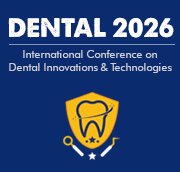Title : Practical guidelines for managing dentine hypersensitivity in clinical practice
Abstract:
Dentine Hypersensitivity (DH) is a relatively common, yet troublesome clinical condition that may have an impact on the quality of life (QoL) of individuals who suffer from it. The pain associated with the condition has been described as rapid on onset, sharp in character and transient in its duration. Several surveys have indicated that clinicians may struggle to identify patients with DH which may in turn lead to the underestimation of the true prevalence of the condition. Furthermore, there is some evidence that would suggest that clinicians lack of confidence in both the diagnosis and management of the condition. The clinical diagnosis of orofacial pain in general can be both time consuming and difficult for several reasons: 1) the difficulty in identifying areas of the mouth that may be causing the problem and 2) the highly subjective nature of pain and its variability between patients. It is therefore important for clinicians to correctly identify patients with DH by excluding any
confounding factors from other orofacial pain conditions prior to the successful management of the condition. The clinician must therefore assess whether the problem that has been diagnosed is 1) mild/moderate generalised sensitivity or 2) moderate/severe localised sensitivity. The severity of the problem will determine whether the treatment is more invasive in nature. For example, for mild/moderate generalised sensitivity over-the-counter (OTC) products such as desensitising toothpastes and mouthrinses can be recommended to the patient for use at home and, for moderate/severe localized sensitivity more invasive in-office (professionally applied) products such as restorations etc., can be suggested. It is important, however, to provide preventive advice such as modifying the toothbrushing technique or changes in the diet to reduce the intake of acidic foods and drink as well as eliminating any predisposing factors rather than simply recommending a particular treatment or technique. The aim of this presentation is to provide practical guidelines for clinicians on the management of DH and to enable them to successfully diagnose and treat the condition.



